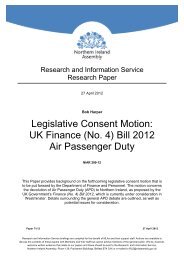Written Answers to Questions - Northern Ireland Assembly
Written Answers to Questions - Northern Ireland Assembly
Written Answers to Questions - Northern Ireland Assembly
You also want an ePaper? Increase the reach of your titles
YUMPU automatically turns print PDFs into web optimized ePapers that Google loves.
Friday 20 July 2012 <strong>Written</strong> <strong>Answers</strong><br />
for the long term needs of an applicant, where there are compelling and site specific reasons for this<br />
related <strong>to</strong> the applicant’s personal or domestic circumstances.<br />
All permissions granted under Policy CTY 6 will be subject <strong>to</strong> a condition restricting the occupation of<br />
the dwelling <strong>to</strong> a named individual and their dependents.<br />
Policy CTY 7 (Dwellings for Non-Agricultural Business Enterprises) of Planning Policy Statement 21<br />
states that planning permission will be granted for a dwelling in connection with an established nonagricultural<br />
business enterprise where a site specific need can be clearly demonstrated that makes it<br />
essential for one of the firm’s employees <strong>to</strong> live at the site of their work.<br />
Planning permission granted under Policy CTY7 will also be subject <strong>to</strong> a condition restricting occupation<br />
of the dwelling for the use of the business.<br />
Article 28 of the 1991 Order provides for an application <strong>to</strong> develop land without compliance with<br />
conditions previously attached <strong>to</strong> a planning permission.<br />
The Department does not have any records of a financial institution having submitted a planning<br />
application, in any of the Area Planning Offices, under Article 28 in each of the last two years <strong>to</strong> have a<br />
condition removed from a previous planning approval.<br />
Table 1 shows the <strong>to</strong>tal number of planning applications approved for the removal of a planning<br />
condition under Article 28 in each of the last two years. These <strong>to</strong>tals include applications for the<br />
removal of an occupancy condition.<br />
TABLE 1: ARTICLE 28 APPROVALS IN EACH OF THE LAST 2 yEARS<br />
year<br />
WA 537<br />
Total No. of Article 28 Applications<br />
Approved by DOE Planning<br />
2010/2011 222<br />
2011/2012* 132<br />
* The year 2011/2012 provides data up until 31 December 2011<br />
I recognise that there are a number of cases where a personal occupancy condition has given rise <strong>to</strong><br />
difficulties in securing a mortgage. I am looking at this issue and have asked <strong>to</strong> meet with the banks <strong>to</strong><br />
identify how this impediment can be eased.<br />
Deterring People from Dropping Litter<br />
Mr Elliott asked the Minister of the Environment what measures are in place <strong>to</strong> ensure a consistent<br />
approach by councils in deterring people from dropping litter.<br />
(AQW 13236/11-15)<br />
Mr Attwood: The Clean Neighbourhoods and Environment Act (<strong>Northern</strong> <strong>Ireland</strong>) 2011 provides district<br />
councils with stronger powers <strong>to</strong> deal more effectively with litter. The enforcement of these powers,<br />
including larger on the spot fines (fixed penalty notices) for littering offences, should deter people from<br />
dropping litter. Larger fines for litter offenders <strong>to</strong>gether with the stronger anti-litter laws generally should<br />
send out a strong message <strong>to</strong> people who litter <strong>to</strong> think about the quality of their environments. Larger<br />
fines should act as an effective deterrent against littering in the future. From 1st April 2012 councils<br />
can impose fines of up <strong>to</strong> £80 on people who litter – this is a significant increase on the previous £50.<br />
It is a matter for each district council <strong>to</strong> determine its own policy with respect <strong>to</strong> the enforcement of<br />
anti-litter laws and the development of their local anti-litter strategies. However, <strong>to</strong> support councils, the<br />
Department has issued comprehensive guidance on the anti-litter laws and also specific guidance on<br />
the use of fixed penalty notices. This guidance should help district councils develop and improve their<br />
strategies for issuing fixed penalty notices for offences contrary <strong>to</strong> environmental law, including litter






